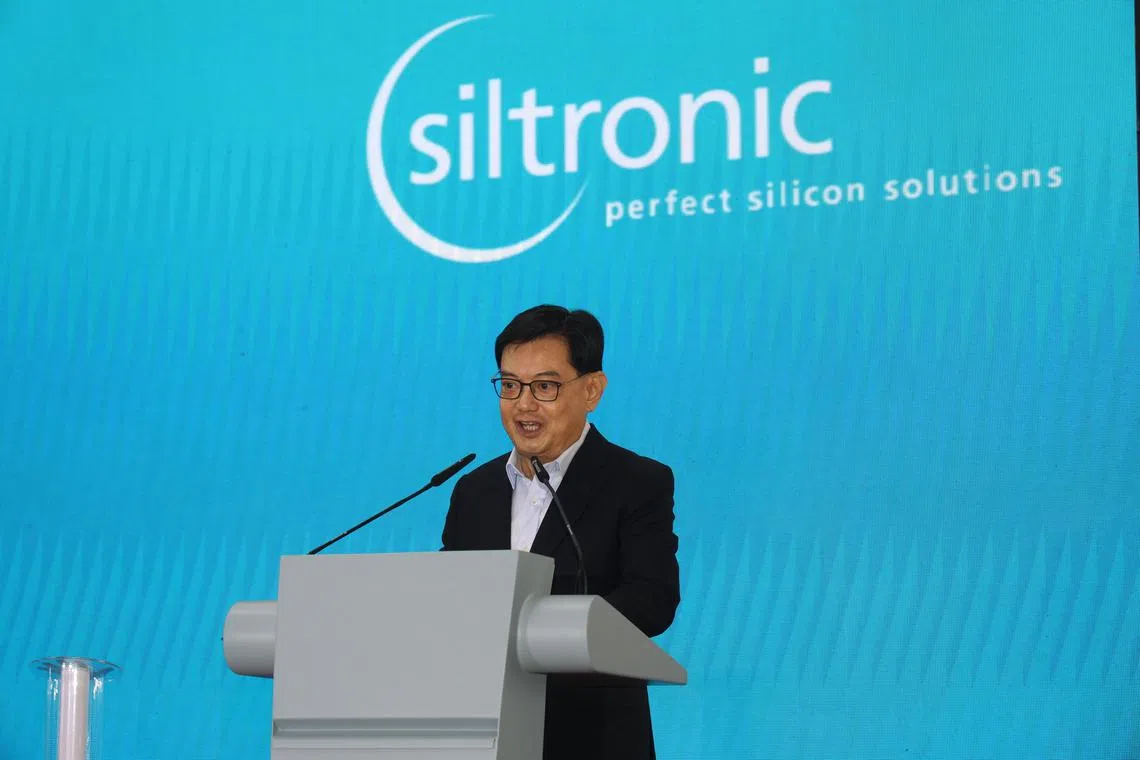Wafer manufacturer Siltronic opens $2.9b facility in S’pore, will expand hiring
Sign up now: Get ST's newsletters delivered to your inbox

DPM Heng Swee Keat said at the opening ceremony of Siltronic's new plant that the digital and green revolutions will make semiconductors even more critical.
PHOTO: LIANHE ZAOBAO
Follow topic:
SINGAPORE – A German firm that supplies semiconductor materials officially opened a $2.9 billion advanced manufacturing facility here on June 12.
The 150,000 sq m factory in Tampines – Siltronic’s third production plant in Singapore – produces silicon wafers for semiconductors, which are used in mobile devices, electric vehicles and data centres.
The plant, which is expected to produce up to 100,000 wafers a month by the end of 2024, has introduced what is called silicon wafer epitaxy capabilities to Singapore for the first time.
Epitaxy is a technology used to boost a wafer’s electrical conductivity.
Siltronic said the plant has 300 employees but this is expected to hit 600 by 2028, with roles ranging from engineers to information technology specialists.
Chief executive Michael Heckmeier said on June 12 that trends such as artificial intelligence (AI) and digitalisation are driving the growing demand for semiconductors.
He also told The Straits Times: “Singapore is a great place in terms of customer proximity... There is also a good workforce and stable infrastructure here.”
The facility will receive more investment in the coming years, Dr Heckmeier added.
Siltronic initially set up here in 1997 and began producing 200mm wafers in 1999.
It partnered with Korean tech giant Samsung in 2006 to manufacture 300mm wafers at a second facility. The new plant will also make 300mm wafers.
Deputy Prime Minister Heng Swee Keat, speaking at the opening ceremony, said that the digital and green revolutions will make semiconductors even more critical.
He said: “Building a smarter, safer, greener and healthier world will require more chips, particularly more advanced chips, that can drive breakthroughs in quantum computing, develop AI applications, and deploy green technologies.”
DPM Heng noted that countries worldwide increasingly recognise the potential of semiconductors to strengthen economies and improve lives.
He said Singapore works with partners from around the world to strengthen semiconductor supply and value chains, adding: “These partnerships have contributed to our economic growth and created good, high-quality jobs for our people.”
Global semiconductor sales stood at about US$530 billion (S$716.7 billion) in 2023, and are expected to reach US$1 trillion by 2030.
Singapore’s semiconductor industry accounts for 40 per cent of the overall manufacturing value added.
DPM Heng said: “We continue to see semiconductor investments as a key enabler of our Manufacturing 2030 vision, especially our goal of growing the manufacturing sector’s value-add by 50 per cent.”
Siltronic’s new facility follows other global semiconductor firms’ expansion here in recent years.
In December 2022, US company Applied Materials said it would build a $600 million plant in Tampines that would expand its manufacturing and research operations, and create 1,000 new jobs.
In July 2023, Singapore-based semiconductor start-up Silicon Box opened its $2.65 billion factory
Correction note: In an earlier version of the story, we said that Singapore’s semiconductor industry accounts for nearly 25 per cent of the overall manufacturing value added. The Economic Development Board has since clarified that it should be 40 per cent.


